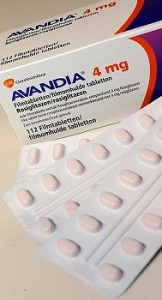What is Avandia? | The Avandia Study | Study Consequences | A Look at the Facts | If You Have Been Injured | Black Box Warning | What To Do
Avandia Update
 Due to mounting concern over the safety of top-selling diabetes drug Avandia, the Food and Drug Administration has requested that a black box warning be added to Avandia to warn consumers of serious cardiovascular risks. A recent review of over 40 clinical studies has concluded that Avandia significantly increases the risk of heart attack and heart-related deaths. This study, authored by prominent cardiologist Dr. Stephen Nissen and published in the New England Journal of Medicine, concludes that Avandia raises the risk of heart attack by 42 percent.
Due to mounting concern over the safety of top-selling diabetes drug Avandia, the Food and Drug Administration has requested that a black box warning be added to Avandia to warn consumers of serious cardiovascular risks. A recent review of over 40 clinical studies has concluded that Avandia significantly increases the risk of heart attack and heart-related deaths. This study, authored by prominent cardiologist Dr. Stephen Nissen and published in the New England Journal of Medicine, concludes that Avandia raises the risk of heart attack by 42 percent.
Avandia is the best-selling oral diabetes treatment in the world. The drug is taken by more than 1 million people in the U.S. and has generated billions of dollars in sales for drug maker GlaxoSmithKline Plc. Avandia lowers blood sugar levels, which can cause complications including kidney and eye damage, by increasing the body’s sensitivity to insulin.
 The FDA approved Avandia in 1999 for the treatment of type 2 diabetes, the most common form of diabetes, and one that affects more than 20 million Americans. According to the American Diabetes Association, in type 2 diabetes, either the body does not produce enough insulin or the cells ignore the insulin.
The FDA approved Avandia in 1999 for the treatment of type 2 diabetes, the most common form of diabetes, and one that affects more than 20 million Americans. According to the American Diabetes Association, in type 2 diabetes, either the body does not produce enough insulin or the cells ignore the insulin.
Since approving Avandia in 1999, the FDA has updated the product’s labeling on several occasions to reflect new data that showed patients taking Avandia may suffer side effects such as fluid retention, edema and congestive heart failure. The most recent label change was in 2006, when the FDA ordered warnings about a potential increase in heart attacks and heart-related chest pain in some individuals using Avandia.
The consumer group Public Citizen has repeatedly warned Glaxo and the FDA about the dangers of Avandia, stating that the drug should only be a “last-choice” option for the treatment of type 2 diabetes because studies have shown it to cause serious cardiac problems.
Our Avandia attorneys understand the risk posed to consumers by dangerous pharmaceuticals. If you or a loved one suffered a heart attack or other serious injury while taking Avandia, you may wish to contact a qualified attorney who can evaluate your case to determine the best way to protect your legal rights. You may be entitled to compensation for your losses and suffering. Please contact our office to speak to a Prescription Drug Lawyer today for a free consultation.
Dr. Nissen and colleague Kathy Wolski conducted a meta-analytic review of 42 publicly available clinical trials, which examined the effects of Avandia compared to alternative diabetes medications or a placebo. These trials included five studies submitted to the FDA in 1999, over 30 trials registered with Avandia’s maker, GlaxoSmithKline, and two recently published trials. The first of these two latter large-scale studies, the Diabetes Reduction Assessment with Ramipiril and Rosiglitazone Medication (DREAM), was designed to determine if Avandia could prevent type-2 diabetes in high-risk patients. The second study, the Diabetes Outcome Prevention Trial (ADOPT) was intended to evaluate the durability of glycemic control using Avandia.
In the 42 studies examined by Nissen, a total of 86 patients taking Avandia suffered heart attacks, compared to 72 in the control group. Additionally, there were 39 cardiovascular-related deaths in the Avandia group, compared to 22 in the control group. In light of this data, Nissen concluded that, “treatment with [Avandia] was associated with a significant increase in the risk of myocardial infarction and with an increased risk of death from cardiovascular causes that was of borderline concern.” Thus, Avandia, used by millions of Americans, has been shown to significantly increase the risk of life-threatening side effects.
While this study was limited in certain regards, Nissen’s data underlined the serious and urgent need for a more comprehensive evaluation in order to clarify the cardiovascular risks associated with Avandia.
 In light of this disturbing scientific evidence, the FDA has called for a more thorough investigation into the link between Avandia and the risk of heart attack, heart failure, and heart-related deaths. The FDA is currently reviewing available clinical data and has called on the makers of Avandia to offer additional clinical trial information. In an Avandia study called the RECORD trial, designed to look specifically at the drug’s cardiovascular risks, interim analysis had already found an increased heart failure rate in patients taking this type-2 diabetes medication.
In light of this disturbing scientific evidence, the FDA has called for a more thorough investigation into the link between Avandia and the risk of heart attack, heart failure, and heart-related deaths. The FDA is currently reviewing available clinical data and has called on the makers of Avandia to offer additional clinical trial information. In an Avandia study called the RECORD trial, designed to look specifically at the drug’s cardiovascular risks, interim analysis had already found an increased heart failure rate in patients taking this type-2 diabetes medication.
In future meetings, the FDA plans to determine if further regulatory action, such as an Avandia recall, is necessary.
- Researchers reported it can increase patients’ risk for heart attack by 43 percent.
- A recent study indicated there was a 64 percent increased risk of dying from cardiovascular causes, compared with patients not taking the drug.
- 60 million prescriptions have been written since the drug was introduced in 1999.
- The FDA has made several adjustments to the warning label on the drug since its release.
- More than 2 million people worldwide now take Avandia for type 2 diabetes, generating $3.2 billion in annual sales for the GlaxoSmithKline.
If You Have Been Injured…
If you or someone you care about is currently taking Avandia for type 2 diabetes, contact your doctor immediately to discuss your medication options.
If you or a family member has suffered adverse side effects while taking Avandia, contact the Avandia lawyers at The Oshman Firm today for a free and confidential case evaluation. We will find answers, hold negligent companies responsible, and fight to get you the compensation you deserve.
The Oshman Firm can help you make informed decisions about your legal rights, so please call the Avandia attorneys at The Oshman Firm at Toll Free: 1(800)-400-8182 for your free legal consultation.
FDA commissioner Dr. Andrew von Eschenbach was the first to publicly announce the FDA’s request for an Avandia black box warning. This announcement came during his testimony at a US House of Representatives hearing. This hearing was convened due to mounting concern that the FDA was failing to properly evaluate and respond to safety issues surrounding Avandia.
 Several lawmakers and health experts have come forward to criticize the FDA and GlaxoSmithKline for failing to respond to evidence of Avandia’s serious health risks. Since Avandia was first approved in the US in 1999, health experts have expressed deep concern over the drug’s cardiovascular safety.
Several lawmakers and health experts have come forward to criticize the FDA and GlaxoSmithKline for failing to respond to evidence of Avandia’s serious health risks. Since Avandia was first approved in the US in 1999, health experts have expressed deep concern over the drug’s cardiovascular safety.
Diabetes expert and incoming president of the American Diabetes Association, Dr. John Buse, publicly expressed concern over Avandia in 1999, fearing that Avandia would increase heart risks. Instead of taking his concerns seriously, Avandia’s makers threatened to hold Dr. Buse liable for any loss in market capitalization that may result from his actions.
Dr. Buse was not alone in his concerns. Over a year ago, FDA drug safety advisor Dr. Rosemary Johann-Liang urged the FDA to add a black box warning to Avandia informing patients of the serious cardiovascular risks posed by this drug. Again, the voices of the concerned went unheeded and Johann-Liang was actually chastised for voicing her concerns over Avandia safety.
During the June 2007 House of Representatives hearing, several lawmakers voiced severe criticism of the FDA and its commissioner. Henry Waxman, a California representative, declared that the agency had dropped the ball when overseeing Avandia safety. He also said that Avandia is a case-in-point highlighting the agency’s frequent failure to adequately inform the public about the serious risks posed by popular pharmaceutical drugs.
While the FDA has made no conclusive regulatory decisions over Avandia, it appears that Avandia side effects are associated with serious and life-threatening cardiovascular risks. These include related Avandia heart attacks, congestive heart failure, related Avandia liver failure and related Avandia hepatitis
If you or a loved one is taking Avandia and you are concerned about these risks, it is important to speak with your doctor to determine the best and safest diabetes treatment for you. If you develop any symptoms of serious Avandia side effects—such as sudden weight loss or gain, swelling, trouble breathing, chest pain, and unexplained fatigue or weakness—you should contact your health care professional immediately.
If you or a loved one has suffered serious injury or death while taking Avandia, you may wish to contact a qualified Avandia attorney who can evaluate your case to determine the best way to protect your interests. You may be able to seek compensation for your losses and suffering. The qualified Avandia lawyers at The Oshman Firm are prepared to examine your case and determine if your qualify to file an Avandia lawsuit. Please contact us today for a free no-obligation consultation.
